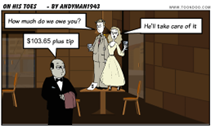Did a guy expect you to split the check on your date? You could say you wanted him to "foot the bill" instead of splitting the check. This post unpacks the meaning and origin of this expression.
Meaning
The expression "foot the bill" means covering a debt's entire costs. If you "foot the bill," you incur the total fee of a financial obligation. "Footing the bill" means you provide full payment for an expensive bill and can or cannot cover the cost.
If someone expects you to "foot the bill," they don't intend to contribute to the cost of the service or goods they're involved in enjoying. It's a way of saying you feel you were treated unfairly by another party after incurring a heavy financial expense.
Example Usage
"I took this girl out for dinner the other night, and she expected me to foot the bill for her meal. I told her that this is the modern dating era, and we're splitting the check. She wasn't happy."
"Why do girls expect the man to foot the bill for everything, but they always go on about gender equality? This is a weird world we live in."
"The company expects me to foot the bill for my expense account this month. I guess I shouldn't have taken the client to the strip club."
"Are you going to foot the bill for this because I don't have the cash to pay for it? You can't expect me to pay for things I didn't use."
"Is there any way you could foot the bill this time? I left my wallet at home, and I don't have any cash on me."
"Will the company foot the bill for this? I don't have that kind of money in my paycheck to handle this expense. Let's just take it out of petty cash."
"You can't expect me to foot the bill for this. That's just unfair. You need to contribute to it as well."
"I don't know why I have to foot the bill for this? Can't you guys help me and contribute to the cost of the tickets? I feel like you're just using me for my money."


Origin
The expression "foot the bill" originates from its predecessor, "foot up," from the early 1500s. The original phrase was meant to calculate the figures on documents and create a total at the footer of the bill. The expression changed to the more modern form, "foot the bill," that we use today in the early 1800s.
The earliest example of the saying in print comes from the Oxford English Dictionary, dated 1819, describing an American article titled "Evans's Pedestrious Tour of Four Thousand Miles," republished in 1904 in the book "Early Western Travels 1748 to 1846."
Phrases Similar to Foot the Bill
- Pay the tab.
- Bear the cost.
- Pick up the check.
Phrases Opposite to Foot the Bill
- Skip the check.
What is the Correct Saying?
- Foot the bill.
- Footing the bill.
Ways People May Say Foot the Bill Incorrectly
The phrase has nothing to do with placing your foot on a bill. It refers to paying the full cost of something. It's rare for people to use this expression in a positive sense. Most examples of "foot the bill" refer to an adverse reaction from the person expected to make the payment.
Acceptable Ways to Phrase Foot the Bill
You can use the expression "foot the bill" when you want to explain that you're liable for the total cost of something. The phrase usually has a negative connotation. For instance, you take a girl out for dinner, and she expects you to "foot the bill" instead of splitting the check.
The phrase can apply to social and professional situations. For instance, you could end up footing the bill; for your partner's car repair, or the company could foot the bill for its tax responsibility. The phrase suits text-based communications and verbal exchanges.